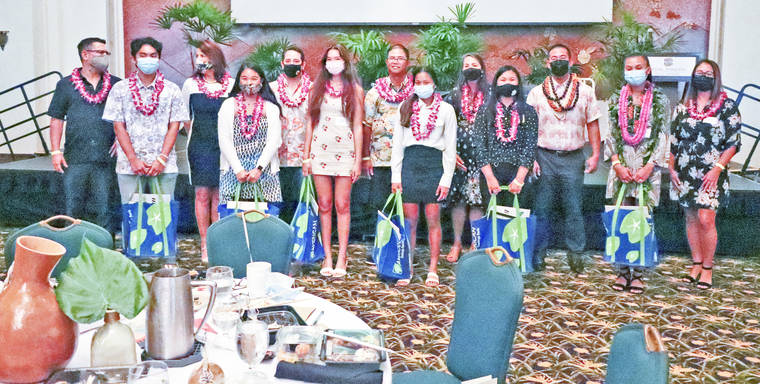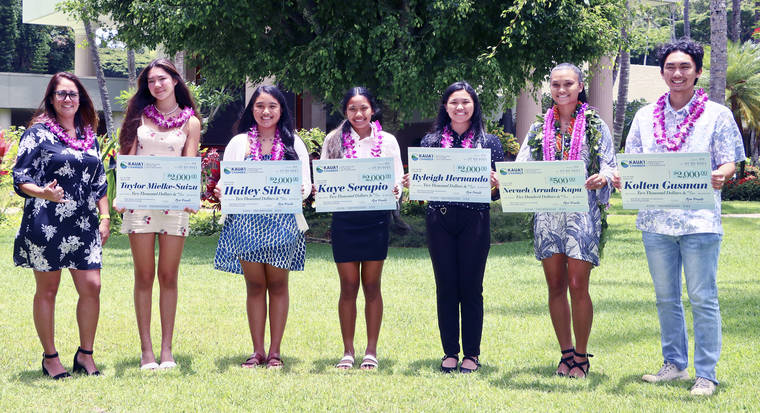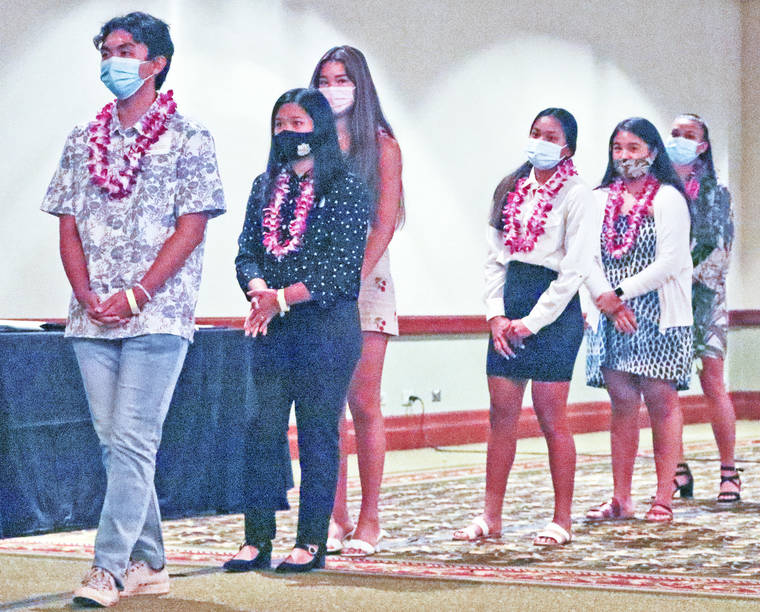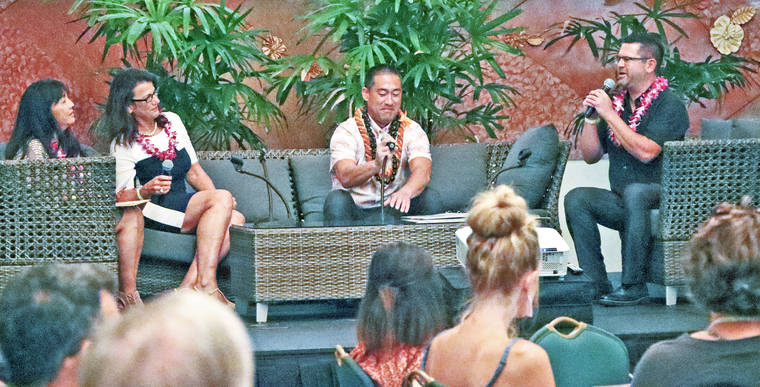LIHU‘E — Mayor Derek Kawakami tackled the island’s ongoing tourism boom and a slew of other topics Tuesday during the Kaua‘i Chamber of Commerce’s Seventh annual Mayor’s Luncheon.
The event, held at the Royal Sonesta Kaua‘i Resort, was the chamber’s first large, in-person gathering since the onset of the coronavirus pandemic and since part of the resort management changed from Marriott to Sonesta (some rooms are still managed by the Marriott Vacation Club).
All attendees were required to provide proof of vaccination or a negative COVID-19 test.
“It’s been a long time since I’ve been in front of a crowd. I’m over the moon to be here,” Kawakami said during his opening remarks. “This is something that needed to happen. I’m so glad that we can share this moment, after a year and a half of challenges.”
Following lunch, Kawakami sat down to talk story with the chamber President and CEO Mark Perriello, board Chair Michelle Emura and Government Affairs Committee Co-Chair Laurie Yoshida.
Emura opened the discussion by asking Kawakami to identify the greatest challenge generated by the revived visitor industry.
“The biggest challenge that we face as a county is, of course, balancing the return of the economy and getting our community acclimated to the visitor industry being back in full throttle after you have a year and a half of this economic slowdown,” the mayor replied. “I don’t think many people anticipated that we were going to see such a big return so quickly, and so people need to get used to it.”
Kawakami likened the change to buying new fish for an aquarium.
“You don’t just throw that fish back in. You have to float it in the bag for a little bit, so that it can get acclimated,” he continued. “We just didn’t get that opportunity to float around in the bag and get comfortable.”
The influx of visitors has not generated new problems for Kaua‘i, according to the mayor. Rather, it has exacerbated pre-existing issues within the county’s infrastructure.
“If we break down where people are frustrated, it’s your simple quality-of-life issues. It’s all pre-pandemic issues,” he said. “It’s the cost of living. It’s housing. It’s sitting in traffic.”
Kawakami also discussed a proposed bill that would establish a transient accommodations tax on Kaua‘i that would affect many businesses operating within the visitor industry. The proposed County Council bill, requested by the administration, is prompted by the recent passage of House Bill 862 in the state Legislature, which eliminates the state distribution of TAT revenue to individual counties, and allows county governments to set their own TAT rate, up to 3%.
If the bill passes, Kaua‘i will implement the full 3%, according to the mayor, who said it would generate $17 million for the county. Most of that money would be spent to continue services provided to the state, he said, while the remainder would further infrastructure improvements, affordable housing and road repairs.
“We would have to take the 3%,” Kawakami reiterated to the crowd of businesspeople. “That is probably something many people didn’t want to hear, but this is the reality that we’re dealing with.”
When asked to outline the county’s plans for local economy recovery in the wake of the coronavirus pandemic, Kawakami praised his administration’s Economic Recovery Strategy Team for its work in targeting grants beneficial to Kaua‘i businesses. He also stressed the importance he places on “infrastructure, infrastructure, infrastructure.”
The county is “focused on just getting as many resources out there for what we feel is the basic core services of government: pick up your trash, fix your roads, make sure your water turns on and working with our partners like KIUC (Kaua‘i Island Utility Cooperative) to keep the lights on” in addition to creating affordable housing, the mayor said.
“It’s very basic, but these are all projects that put people back to work. These are jobs that pay a living wage, and these are the workers that are going to frequent our restaurant establishments, leave a nice tip and come back over and over and over again,” Kawakami continued. “This is the way we want to invest our local money, is through our local economy. The best way that government can do it is focus our energy on fixing things that need to be fixed.”
The wide-ranging question-and-answer session concluded when Perriello read an audience-submitted question that prompted Kawakami to address Maui Mayor Mike Victorino’s recent “scolding” of the airline industry.
“Is there anything that Kaua‘i intends to do to limit the number of tourists?” Perriello asked.
“No. I don’t have the authority as mayor to control the airline industry, and I would be hesitant, right now, to not count my blessings that people are getting back to work,” Kawakami answered, noting he would be remiss if he forgot the county’s still-recent period of economic downturn.
“One of the reasons this community has been successful, as far as keeping people safe and healthy during the pandemic, was asking our business owners and the workers to make a sacrifice: to stay home, to be stressed out, to not be able to pay their rent, to not be able to pay their utilities,” he said. “Now, all of a sudden, people want to come to Kaua‘i.”
Kawakami closed by returning to his initial claim: that current frustrations sparked by the influx of visitors are spurred by longtime problems his administration is working to fix.
“This is what it’s going to look like,” he said. “This is what it looked before the pandemic. Remember, what is the biggest challenge? Cost of living, traffic, housing.”
•••
Scott Yunker, general assignment reporter, can be reached at 245-0437 or syunker@thegardenisland.com.









About how many tourist coming to the end of the year? I don’t think they can do a lot. Tourist industry being hotels being filled.
Well, i think you guys better come up with a better idea to get more tourist in if that is important to local and state business. A lot of out of work people.
Just how much are you getting paid to bring in tourist? If that was the case? Just how do you plan on doing this ?
The problem we need to remedy right away is the lack of available workers. The current situation with the federal additional funds being given to those filing for unemployment is providing too big of an unemployment benefit. Potential workers are being “given” too much money. They don’t want to go back to work. Governor Ige needs to stop taking the federal finds and enforce the unemployment regulations. 11% unemployment on Kauai and every business I know of is looking for employees at wages much higher that pre-covid. the resolution to the problem is easy. It just takes the political will to make the right decisions.
Im so sad with dereks handling of all this. I totally support an open economy and doing away with corvid regulations. Mahalo for your aloha.